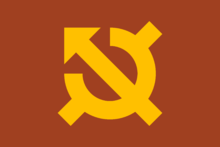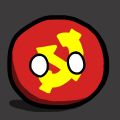imported>EugeneTLT |
imported>EugeneTLT mNo edit summary |
||
| Line 148: | Line 148: | ||
*[[File:Cball-Myanmar.png]] [[Stratocracy|Myanmar (Burma)]] | *[[File:Cball-Myanmar.png]] [[Stratocracy|Myanmar (Burma)]] | ||
*[[File:Cball-Singapore.png]] [[Authoritarian Capitalism|Singapore]] (LKY Era) | *[[File:Cball-Singapore.png]] [[Authoritarian Capitalism|Singapore]] (LKY Era) | ||
*[[File: | *[[File:Ilminism.png]] [[Ilminism|Ilminist South Korea]] | ||
*[[File:Cball-Taiwan.png]] [[Tridemism|Republic of China]] (1930s-1980's) | *[[File:Cball-Taiwan.png]] [[Tridemism|Republic of China]] (1930s-1980's) | ||
}} | }} | ||
Revision as of 18:00, 1 May 2023
Not to be confused with
Capitalist Communism and
Dengism.
State Capitalism (condensed to StateCap and also known as Dirigisme) is an economic system where the state plays an active role in business or commercial activity. This can be direct in the form of state-owned enterprises or companies where the state has controlling shares, in an indirect form of the state planning through government agencies organized along for-profit and business management lines, or through state-sponsored private business activities. If the state owns or controls all the means of production or is the primary shareholder, this is called state monopoly capitalism (StateMoCap). State capitalism is usually seen as ![]() economically center since it denies the means of production to workers, yet is often collectivist in nature.
economically center since it denies the means of production to workers, yet is often collectivist in nature.
Variants
 Dirigisme
Dirigisme
Dirigerism or Dirigisme (from French diriger, "to direct") is an economic system in which the national government plays an imperative role in directing and coordinating the economy through public policy. By utilizing market instruments like taxation and monetary investment, the state is understood to be capable of correcting inefficiency and failures commonly found among tradition free-market economics, while also achieving it's desired material objectives.
 Socialism with Chinese Characteristics
Socialism with Chinese Characteristics
Socialism with Chinese Characteristics is a set of political theories and policies of the ![]() Chinese Communist Party that are seen by their proponents as representing
Chinese Communist Party that are seen by their proponents as representing ![]() Marxism-Leninism adapted to Chinese circumstances and specific time periods, consisting of
Marxism-Leninism adapted to Chinese circumstances and specific time periods, consisting of ![]() Deng Xiaoping Theory,
Deng Xiaoping Theory, ![]() Three Represents,
Three Represents, ![]() Scientific Outlook on Development, and
Scientific Outlook on Development, and ![]() Xi Jinping Thought on Socialism with Chinese Characteristics for a New Era.
Xi Jinping Thought on Socialism with Chinese Characteristics for a New Era.
 East Asian Model
East Asian Model
The East Asian model pioneered by Japan, is a plan for economic growth whereby the government invests in certain sectors of the economy in order to stimulate the growth of specific industries in the private sector. It generally refers to the model of development pursued in East Asian economies such as Japan, South Korea and Taiwan. It has also been used by some to describe the contemporary economic system in Mainland China after Deng Xiaoping's economic reforms during the late 1970s and the current economic system of Vietnam after its Đổi Mới policy was implemented in 1986.
History
State Capitalism is not a formal ideology with unifying theory, nor is it used in a self descriptive term. State Capitalism is believed by some to have first been used and coined, by ![]() Friedrich Engels, in his and
Friedrich Engels, in his and ![]() Marx's book "Socialism: Utopic and Scientific". It was later on also used by many
Marx's book "Socialism: Utopic and Scientific". It was later on also used by many ![]() Anarchists,
Anarchists, ![]() Left Communists, and
Left Communists, and ![]() Council Communists, in criticism of the
Council Communists, in criticism of the ![]() USSR.
USSR.
In the modern day state capitalism has been used to described countries like ![]() Taiwan,
Taiwan, ![]() South Korea, and
South Korea, and ![]() China. Critics of
China. Critics of ![]() United States, such as Noam Chomsky, believe it is state capitalist since government backs
United States, such as Noam Chomsky, believe it is state capitalist since government backs ![]() big business interests while playing a substantial role in development (e.g., bailouts and public research respectively).
big business interests while playing a substantial role in development (e.g., bailouts and public research respectively). ![]() Libertarian socialists also describe the
Libertarian socialists also describe the ![]() Soviet Union as state capitalist for centralizing surplus value extraction and commodity production;
Soviet Union as state capitalist for centralizing surplus value extraction and commodity production; ![]()
![]()
![]()
![]()
![]() anti-revisionist Marxist-Leninists would erroneously apply this criticism to
anti-revisionist Marxist-Leninists would erroneously apply this criticism to ![]() the Khrushchev administration and
the Khrushchev administration and ![]()
![]()
![]() later administrations.
later administrations.
 France
France 

Before World War II, France had a capitalist economic system ![]() with many small, family-owned companies that were not as efficient as larger industrial groups in other countries like Germany
with many small, family-owned companies that were not as efficient as larger industrial groups in other countries like Germany ![]() and the United States
and the United States ![]() . The war devastated France, with industries and infrastructure being destroyed or seized by Germany
. The war devastated France, with industries and infrastructure being destroyed or seized by Germany ![]() , and the country facing the prospect of long-term rationing in the aftermath. Some French businesses and politicians lost credibility after collaborating with the German occupiers during the war.
, and the country facing the prospect of long-term rationing in the aftermath. Some French businesses and politicians lost credibility after collaborating with the German occupiers during the war.
After the war, French governments of all political stripes sought to modernize and develop the country's economy, with the goal of matching the advanced economy of the United States. The French government implemented dirigisme, a policy of strong government intervention in the economy ![]() , to achieve this goal. This policy approach was accompanied by the development of Meritocracy
, to achieve this goal. This policy approach was accompanied by the development of Meritocracy ![]() and Technocracy
and Technocracy ![]() , with elite state-trained administrators and engineers taking leadership roles in industry.
, with elite state-trained administrators and engineers taking leadership roles in industry.
During the 1945-1975 period, known as the "Glorious Thirty," France experienced significant economic growth and a population boom. Dirigisme was supported by conservative ![]() governments led by Charles de Gaulle
governments led by Charles de Gaulle ![]() and Georges Pompidou
and Georges Pompidou ![]() , and seen as a compromise between American policies of minimal government intervention and Soviet policies of total state control. In 1981, Socialist president François Mitterrand
, and seen as a compromise between American policies of minimal government intervention and Soviet policies of total state control. In 1981, Socialist president François Mitterrand ![]() was elected and pursued dirigisme policies, including nationalizing industries and banks
was elected and pursued dirigisme policies, including nationalizing industries and banks ![]() . However, economic difficulties and inflation led the government to abandon dirigisme in 1983 and adopt austerity measures instead. Dirigisme has not been widely supported by subsequent French governments, though some elements of it remain in place.
. However, economic difficulties and inflation led the government to abandon dirigisme in 1983 and adopt austerity measures instead. Dirigisme has not been widely supported by subsequent French governments, though some elements of it remain in place.
 Imperial Japan
Imperial Japan 


W.I.P.
 United States
United States 
W.I.P.
 South Korea
South Korea 

W.I.P.
 ROC/Taiwan
ROC/Taiwan 


W.I.P.
 China
China 








W.I.P.
 Singapore
Singapore 

W.I.P.
 Belarus
Belarus 
W.I.P.
Beliefs
State Capitalism can take on many forms, both theoretical and material, as it did throughout history:
- Industries being ran as private enterprise, with the state being it's primary or sole shareholder.
- State direction or control of investment, either indirectly (e.g., through contracts) or directly (sovereign wealth funds).
- "Privatization" of the State, so it operates as a single, for-profit economic monopoly.
- Implementing decentral or central planning, while maintaining private resource ownership and markets.
- A strong, for-profit public sector that co-exists and/or competes with the private sector.
- ^Any combination of the above.
How to Draw
The symbol of State Capitalism comes from a post on the r/vexillology subreddit by SekaiDarkness, called "Flag of State Capitalism/Corporatism". The flag is supposed to symbolize an balance between economics of ![]() capitalism and
capitalism and ![]() communism.
communism.

- Draw a ball and color the inside burnt orange or drab red.
- Draw a yellow left-facing cent symbol (¢) and a yellow arrow crossed through it.
- Draw the eyes.
You're done!
Relations
Friends
 Dengism - You carry my ideas so well!
Dengism - You carry my ideas so well! Neocameralism - Pretty much me but a bit more private.
Neocameralism - Pretty much me but a bit more private. Cameralism - State-owned economy gang!
Cameralism - State-owned economy gang! Nordic Model - A one trillion dollar sovereign wealth fund? Truly beautiful!
Nordic Model - A one trillion dollar sovereign wealth fund? Truly beautiful! Corporatism - Thanks for teaching me all I know but why don't you call yourself state capitalist?
Corporatism - Thanks for teaching me all I know but why don't you call yourself state capitalist? Social Authoritarianism - Fellow regulated economy fan, we sometimes overlap.
Social Authoritarianism - Fellow regulated economy fan, we sometimes overlap. Social Corporatism - Best of
Social Corporatism - Best of  Both
Both  worlds.
worlds. Monarcho-Capitalism - I love Saudi Aramco!
Monarcho-Capitalism - I love Saudi Aramco! Afunism - "The ZAMINT government must have input on the market to make sure that the nation as a whole is always benefiting."
Afunism - "The ZAMINT government must have input on the market to make sure that the nation as a whole is always benefiting."
Frenemies
 Capitalist Communism - I admit that I borrow elements from both, but only the good parts.
Capitalist Communism - I admit that I borrow elements from both, but only the good parts. Mercantilism - Even he thinks I'm too statist & that's says a lot.
Mercantilism - Even he thinks I'm too statist & that's says a lot. Corporatocracy - Basically me, but with more focus on pleasing the rich.
Corporatocracy - Basically me, but with more focus on pleasing the rich. State Socialism - My confused brother in denial. But countries such as Brazil and Iraq prospered in the past because of effective centralization
State Socialism - My confused brother in denial. But countries such as Brazil and Iraq prospered in the past because of effective centralization and economic bureaucracy. Authoritarian Capitalism - Not regulatory enough. Although
Authoritarian Capitalism - Not regulatory enough. Although  Morales-Bermúdez did good when partially keeping the
Morales-Bermúdez did good when partially keeping the  Velascoist economy, but without the leftist stuff (I am an economic centrist anyway), unlike those
Velascoist economy, but without the leftist stuff (I am an economic centrist anyway), unlike those  Fujimorists who deregulated the economy.
Fujimorists who deregulated the economy. Progress Party - A bit anti-statist for my taste but hey he really likes the oil fund[1].
Progress Party - A bit anti-statist for my taste but hey he really likes the oil fund[1].
Enemies
 Market Socialism - Literally my opposite.
Market Socialism - Literally my opposite. Distributism - Similar to the guy above.
Distributism - Similar to the guy above. Anarcho-Communism - Calls any "socialist" state he dislikes me.
Anarcho-Communism - Calls any "socialist" state he dislikes me. Mutualism - Not wanting decentralized forces of production does not make me a fascist!
Mutualism - Not wanting decentralized forces of production does not make me a fascist! Anarcho-Capitalism - Privatization of industry?! And fuck your deregulations, Anarkiddy!
Anarcho-Capitalism - Privatization of industry?! And fuck your deregulations, Anarkiddy! Anarchism - Anarchy? CRINGE!
Anarchism - Anarchy? CRINGE! Agorism - Black markets? CRINGE!
Agorism - Black markets? CRINGE!
Gallery
Portraits and Artwork
-
Original image
-
-
-
-
East-Asian Model
Further Information
Literature
Wikipedia
- State capitalism
- Socialism with Chinese characteristics
- State monopoly capitalism
- State-owned enterprise
- Dirigisme
- Corporatisation
- Sovereign wealth fund
- Monotown
- Economy of China
- Lotteries in the United States




